| Porky Pig
|
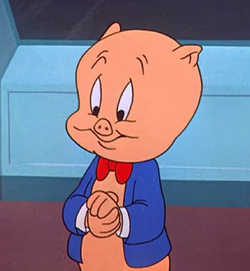
W-welcome to the w-we-be-wuh-wiki page, everyone!
|
| Species
|
Pig
|
| Gender
|
Male
|
| Member of
|
Tune Squad
Looney Builders
|
| Affiliation
|
Daffy Duck
Bugs Bunny
Petunia Pig
Sylvester
|
| Father
|
Phineas Pig
|
| Mother
|
Mrs. Pig in The Looney Tunes Show
|
| Brother(s)
|
Patrick, Peter, Percy, and Portis Pig[Note 1]
|
| Other relative(s)
|
Three nephews, Cicero Pig, Porko Pig and Puerco Pig
One descendent, Pinkster Pig, in Loonatics Unleashed
One niece, Sow Pig
|
| Marital status
|
Single[Note 2]
|
| Daughter(s)
|
Priscilla Pig[Note 3]
|
| First appearance
|
MM: I Haven't Got a Hat (1935)
|
| Played by
|
Joe Dougherty (1935-1937)
Mel Blanc (1937-1989)
Bob Bergen (Since 1990)
Noel Blanc (1990)
Jeff Bergman (1990-2002)
Joe Alaskey (1992)
Greg Burson (1992-1994)
Rob Paulsen (1993)
Eric Goldberg (1996)
Billy West (1999, 2003-2004)
Eric Bauza (2021)
|
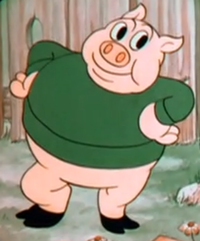
I Haven't Got a Hat
|
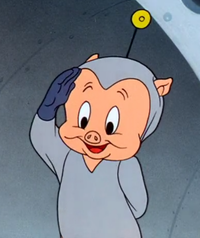
Porky as Space Cadet.
|
File:Animaniacs Porky Pig.png
Animaniacs
|
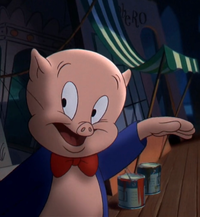
Space Jam
|
File:BLT Porky.png
Baby Looney Tunes
|
File:Space Cadet 2003.png
Duck Dodgers
|
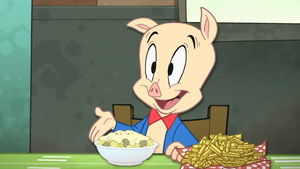
The Looney Tunes Show
|
File:NLTS Porky.png
New Looney Tunes
|
File:LTC Porky.png
Looney Tunes Cartoons
|
File:ANL Porky.png
Space Jam: A New Legacy
|
File:ANL 3D Porky.png
CGI Porky in Space Jam: A New Legacy
|
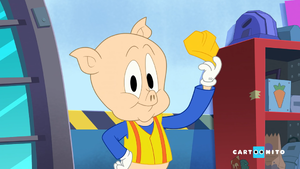
Bugs Bunny Builders
|
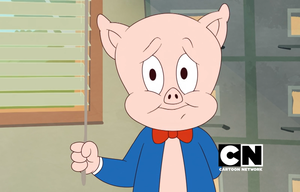
Tiny Toons Looniversity
|
Porky Pig is an anthropomorphic pig and a character in the Looney Tunes animated franchise. He is well known for his stuttering speech impediment and ending many cartoons wit the phrase, "That's all, folks!" He was the first cartoon character created by Warner Bros. to draw audiences based on his star power, and the animators created many critically acclaimed shorts featuring the character. Even after he was supplanted by later characters, Porky continued to be popular with audiences, and more importantly, the Warners directors, who recast him in numerous everyman and sidekick roles. His voice was originated by Joe Dougherty, but is better remembered by his successor, Mel Blanc.
During the golden age of American animation, he appeared in a total of 153 animated short films, making him the second-most frequent character in the Looney Tunes and Merrie Melodies shorts, behind Bugs Bunny's 167 shorts and ahead of Daffy Duck's 130 shorts.
Porky's protégé in Tiny Toon Adventures is Hamton J. Pig.
Character description
Porky is normally characterized as a happy-go-lucky individual. He is generally kind, cheerful, and exhibits some innocent, child-like qualities. While he is quite shy when compared to others, he remains to be a mild-mannered individual overall. Despite his "everyman" status, Porky's behavior wildly varies by his appearances depending on the situation. At times, his personality ranges from being a simple-minded foil, while in others, he can be neurotic and occasionally violent, revealing that he has his own limits. However, both extremes tend to only exist depending on how sympathetic or stressed he can get in a particular scenario.
Porky serves as a straight man for other characters that are more brasher than him. More notably, he is often paired with Daffy Duck, who, in cartoons during the late 1930s and 1940s, exhibited a zany, over-the-top demeanor. Porky served as Daffy's foil during that period, displaying a comedic dynamic that emphasized their different personalities. In later cartoons since the 1950s, when Daffy adopted a more egotistical personality, Porky sometimes served as his more competent sidekick, even though he is still portrayed as the latter's comic foil.
Porky's most distinctive trait is his stutter, for which he sometimes compromises by substituting certain words; for instance, "What's going on?" might be "What's guh-guh-guh-guh— ... what's happening?" In other examples, he would also replace a much simpler word with one that is more complicated than what is meant to be said.
Appearances
TV series
Movies
Shorts
Comics
Video games
Theme parks
Biography
Original Cartoons
The Early Years
In his debut appearance, I Haven't Got a Hat, he attended as a young student and recited the poems Paul Revere's Ride and The Charge of the Light Brigade in class (albeit strained by his excessive stutter). He was the fellow classmate of a short-lived star, Beans the cat, along with several other who appeared like Little Kitty, the twin puppies Ham and Ex, and Oliver Owl.
The Daffy Days
| This article or section is a stub. You can help the Looney Tunes Wiki by expanding it.
|
Playing Sidekick
| This article or section is a stub. You can help the Looney Tunes Wiki by expanding it.
|
We're All a Little Looney
Template:Sub
Come On and Slam! And Welcome to the Jam!
| This article or section is a stub. You can help the Looney Tunes Wiki by expanding it.
|
Duck Dodgers of the 24th and One Half Century
| This article or section is a stub. You can help the Looney Tunes Wiki by expanding it.
|
Porky Gets Modern
| This article or section is a stub. You can help the Looney Tunes Wiki by expanding it.
|
Going Down the Rabbit Hole
| This article or section is a stub. You can help the Looney Tunes Wiki by expanding it.
|
Porky Gets Retro
| This article or section is a stub. You can help the Looney Tunes Wiki by expanding it.
|
It's Hard Hat Time
| This article or section is a stub. You can help the Looney Tunes Wiki by expanding it.
|
Porky Sells Out
| This article or section is a stub. You can help the Looney Tunes Wiki by expanding it.
|
Development
Porky Pig was created by Friz Freleng for the Merrie Melodies short, I Haven't Got a Hat, after studio head Leon Schlesinger assigned him and Jack King to do a cartoon version of Hal Roach's Our Gang films, and the two created an ensemble consisting Beans, Porky, Oliver Owl, Ham and Ex, and Little Kitty. The cast was meant to be a replacement to Warner's previous cartoon lead Buddy, who originally replaced Bosko after the departure of Hugh Harman and Rudolf Ising, but was less popular. Freleng named the pig after two of his childhood friends, brothers "Porky" and "Piggy".
Joe Dougherty was hired by Freleng to voice Porky in order to move away from the falsetto-type voice that was commonly used in cartoons at the time, in addition to Dougherty being an actual stutterer. As told in an interview by Joe Adamson, Freleng claimed to have originated the pig's stutter, stating, "I used the stuttering because I thought it would give him (Porky Pig) something different, some character."[2] However, Dougherty was let go by Warner Bros. in 1937 for his uncontrollable stutter, after voicing the character for two years, and additional lines were done by Count Catelli in response.[3] Freleng stated that, "When he delivered his lines, he used up excessive amounts of soundtrack film since he couldn't control his stammerings. It just became too expensive to keep him so we finally let him go."[4] Mel Blanc took his place in Porky's Duck Hunt, after winning an audition to voice the character. Blanc continued to make use of Porky's stutter, but greatly reduced it for comedic effect.[2]
Gallery
- Main article: Porky Pig/Gallery
Toys and merchandise
- Main article: Porky Pig/Toys
Behind the scenes
In popular culture
| WARNING: The following section contains content that may be seen as mature or offensive to some readers. Reader discretion is advised.
|
- Porky (voiced by Mel Blanc) made a special appearance in a 1939 blooper reel by Warner Bros., Breakdowns of 1939, where he is seen trying his best not to swear after smacking his thumb with a hammer. In several of his "takes," Porky attempts to cry out "Son of a bi-bi-bi..." before quietly simmering his phrase down, and "Oh, son of a bi-bi-, son of a bi-bi-, son of a bi-bi-bi-... gun!" In the last "take," Porky turns to the camera and says "Ha-ha-ha! You thought I was gonna say 's-s-son of a bitch,' didn't ya?!"[5]
- In the 1972 film What's Up, Doc?, during the final scene where Harold and Judy kiss each other at an airplane, a closing sequence of Porky saying "That's all, folks!" plays after Bugs and Elmer's musical number in the similarly-titled What's Up Doc?
- In "Time," an episode of the British sitcom The Young Ones, Rick wants Neil to lick tea he knocked out off the floor and onto the ground, although Neil objects because it has sugar. Getting angrier, Rick further demands that he cleans it up by licking it and calls him a pig and then Porky, which Neil finds offensive because pigs are smart like dolphins, so sarcastically, Rick wants to know what scientific contributions they have made, did Porky the Pig create the internal combustion engine?
- In The Simpsons episode "Bart the Murderer," Fat Tony bets against a racehorse called "That's All Folks," the catchphrase commonly associated with Porky.
- In the California Dreams episode "Battle of the Bands," Tony assists Matt's stuttering to ask out Angela, a clumsy girl with glasses, when Tony decides to just ask her out for him because he can't stand the "Porky Pig lockjaw" anymore.
- In the Seinfeld episode "The Bris," Kramer says, "That's all folks," after accusing a doctor of having a pig man.
- In the 1993 film Mrs. Doubtfire, Daniel, a voice actor who had issues with his Tweety-like character smoking, quit and told his boss to "piss off" while mimicking Porky's stutter.
- In the Everybody Loves Raymond episode "Talk to Your Daughter," Ally has a Looney Tunes Figural Porky Bank in her bedroom.
- In "Episode Three" (series 7) of the BBC Radio 4 sketch program Dead Ringers, BBC News reports on the Cartoon Animal Bill of Rights affecting Shaggy Rogers from Scooby-Doo and Officer Dibble from Top Cat, with reporter Michael Burke signing off with a "That's all, folks!" in the voice of Porky.
- In the Two and a Half Men episode "Go East on Sunset Until You Reach the Gates of Hell," Jake has a pet guinea pig he calls Porky, and when it dies, Charlie says, "That's all folks."
- In the Doctor Who novel The Crooked World, one of the inhabitants of the planet is a pig farmer named Streaky Bacon, whose speech impediment mimics Porky's stutter.
- In the Family Guy episode "Turban Cowboy," Peter and Muhammad tune in to watch the end of Muslim Looney Tunes, where a Muslim Porky appears and says that as a pig, he is very dirty and should not be touched by humans.
- In the Fresh Off the Boat episode "Chestnut Gardens," when Eddie says that a beer stein is bottomless, his mother compares it to Porky Pig with a blazer.
- In the Batwoman episode "Fair Skin, Blue Eyes," young Ryan visits Galaxy Comics, with Looney Tunes comics in a stand at the front, which includes Looney Tunes #239 with Porky on the cover.
- In the Velma episode "Private Velmjamin," Fred wants to return a nativity miniature model with the Looney Tunes to Father O'Rourke, after Fred briefly became Catholic. Elmer is baby Jesus, Sylvester is Joseph, Granny is Mary, and Daffy, Porky, and Bugs are the three wise men.
- In the Paradise PD episode "Tucker Carlson is a Huge D**K", Porky is one of the officers in Bullet's Cartoon Animal Force.
Full House
- "Middle Age Crazy," "Fogged In," "Working Mothers, "Pal Joey," "El Problema Grande de D.J.," "Blast from the Past," "Nerd for a Day," "Joey & Stacy and... Oh, Yeah, Jesse," "Those Better Not Be the Days," "The I.Q. Man," "Terror in Tanner Town," and "Happy New Year:" A 1986 Looney Tunes poster was added to Joey's bedroom in the second season onwards, featuring Bugs, Daffy, Porky, Sylvester, Road Runner, and Tweety.
- "Star Search:" Joey makes Michelle laugh, which resolves his feelings of not reaching his 10 year goal by promising her he will continue his comedy, by paraphrasing Porky's catchphrase, in character, "That ain't all folks!"
Robot Chicken
- Main article: Robot Chicken
- "8 Carrot:" Porky is the DJ at Bugs and Elmer's Rap Battle.
- "Immortal:" In "Porky's," the titular strip club is mistaken for a place that Porky owns. Bugs and Daffy walk into it, before leaving and reentering.
- "Snarfer Image:" At the end of "Wooper", Porky Pig does his famous "That's all Folks!" before being shot in the head, presumably by Elmer.
Notes
References










